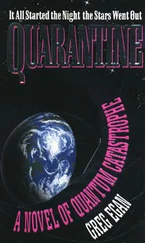Jim Crace - Quarantine
Здесь есть возможность читать онлайн «Jim Crace - Quarantine» весь текст электронной книги совершенно бесплатно (целиком полную версию без сокращений). В некоторых случаях можно слушать аудио, скачать через торрент в формате fb2 и присутствует краткое содержание. Год выпуска: 1998, Издательство: Straus and Giroux, Жанр: Современная проза, на английском языке. Описание произведения, (предисловие) а так же отзывы посетителей доступны на портале библиотеки ЛибКат.
- Название:Quarantine
- Автор:
- Издательство:Straus and Giroux
- Жанр:
- Год:1998
- ISBN:нет данных
- Рейтинг книги:4 / 5. Голосов: 1
-
Избранное:Добавить в избранное
- Отзывы:
-
Ваша оценка:
- 80
- 1
- 2
- 3
- 4
- 5
Quarantine: краткое содержание, описание и аннотация
Предлагаем к чтению аннотацию, описание, краткое содержание или предисловие (зависит от того, что написал сам автор книги «Quarantine»). Если вы не нашли необходимую информацию о книге — напишите в комментариях, мы постараемся отыскать её.
Quarantine
Quarantine — читать онлайн бесплатно полную книгу (весь текст) целиком
Ниже представлен текст книги, разбитый по страницам. Система сохранения места последней прочитанной страницы, позволяет с удобством читать онлайн бесплатно книгу «Quarantine», без необходимости каждый раз заново искать на чём Вы остановились. Поставьте закладку, и сможете в любой момент перейти на страницу, на которой закончили чтение.
Интервал:
Закладка:
But minutes passed. There were no rocks. She was not stifled by his body pressing down on hers. Finally she found the courage to crouch in the corner of the grave and peer out, a rodent peeping from its burrow. Of course she did not recognize the people that she saw, but neither was she frightened of them now. They were, at least, the living. No Musa then. Not even death and its three partisans. She was exposed to nothing worse than strangers.
Miri felt too foolish and too shaken to emerge. Just like a child, trapped underneath the mat when adults come. She would simply have to wait for a natural opportunity to escape. Sunset, perhaps. By sunset, surely, Musa would be safe and cold, and she could slip away unseen and go back to the tent. She’d ululate for him. That — precisely — was the least that she could do. In the morning she would get him on the donkey’s back-impossible without some help — and bury him. Here were the stones — where she now crouched, a hen on barren eggs — that would be Musa’s bed-mates. There wasn’t one she hadn’t touched while she was digging. What other widow could make such a boast, or know her husband’s grave more intimately? How very dutiful she’d been.
For the moment, Miri had little else to do but study stones and, once in a while, when she grew too stiff for her interment, pop her head above the topsoil and watch these new arrivals select their caves, as far from each other as was possible, though close enough for safety in the night. They were like ravens, not like rooks — neither sociable nor hostile with their neighbours. She watched them set up home, one by one, throughout the afternoon. They kicked out the detritus of animals and other visitors, turned stones to check for snakes and scorpions, pulled thorns across the cave entrances to blunt the wind and keep animals out, threw bones as far away as possible. Then they sat in front of their new habitations, looking out across the valleys and waiting for the darkness and, at last, the arced and glinting goblet of the moon. The start of quarantine.
Of course, for all their birdlike meditation and reserve, they could not help but notice Miri watching them. They were so concentrated on the land which would be their host for the next forty days, and so fearful of it, that hardly a beetle could move without them knowing it. How then could they avoid seeing the newly exposed grave and its occupant, both gaping? But none of them behaved as if it were odd, or even unexpected, that there should be a woman who, seemingly, had dug a pit for herself and was content to squat in it aH afternoon. This was the season of the lunatics. If her presence made them fearful and uncomfortable, then so what? That’s what they’d come for, after all, to encounter and survive anxieties like this.
Miri wished she had the nerve to stand, waist-high in stones and soil, and call to them. She was a rook. She needed company. She’d ask them what their purpose was, what they were seeking in the caves. She’d ask if they might — later, soon — help to lift her husband on the donkey’s back and bring his body here for its interment. She could not manage it alone, she’d say, and tell them she was abandoned, widowed, pregnant, borderless. . and desperate to urinate. Her child was pressing on her bladder now. Her back and thighs were tormenting her again. But Miri was uncertain ofthe visitors, their sullenness, their lack ofs^miles, the absence ofany conversation or greetings between them. She was afraid that they might ask, Where is your husband now? Then, Why aren’t you sitting by the corpse? Or, Have you run away and left the man to die? So Miri dared not leave her hiding place. Nor dared she urinate. It would be a sacrilege, and dangerous. To wet a husband’s grave like that would bring bad lack. So she squatted amongst the stones, her bladder nagging, her nerve-ends trapped, her conscience throbbing like a wound, her untied hair turned brown with dust, and waited for the sun to drop.
5
There were eleven caves above the poppy line — a decent choice for these four visitors. Enough room even for the fifth when he or she arrived. The caves were not hard to see. Their darkly shadowed entrances made a constellation of black stars against the copper of the cliff There were two easily accessible caves at the cliff foot, partly obscured by salt bushes and fallen debris, and then a further four above, opening on to a sloping terrace. Higher still, and less inviting, were three more caves, set far apart. And then, a hundred paces to the left, a further two, halfway up a seam of darker, stony soil.
The first of the cave-dwellers to arrive and startle Miri had been the oddest of them all. Was that the word? Not odd, perhaps, but out of place. He was a gentile, blond-haired and narrow-faced; quite beautiful, she thought. And a touch sinister. A Roman or a Greek perhaps, a traveller. But there was nothing Greek or Roman in his quality of clothes. He wore a local tunic and a high, woven cap which made his face seem even thinner than it was. His skin was dry from too much sun. But he seemed strong, like leather thongs are strong. Designed to carry loads. And he was heavily and well equipped — a large goatskin for water, a rush bed-mat, a cloak, a walking staff made from an elongated piece of tarbony with ram-horn curls halfway along its length so that when he rested on its nub his weight had to drop and spiral twice before it reached the ground. He’d taken the smallest and the wa^est of the middle rank of caves.
The second chose the middle rank as well; his cave was twenty paces from the Roman or the Greek, the furthest to the right, and in a shaUow declivity of the terrace which would protect the entrance from his neighbour’s gaze, and from the evening sun. He was an elderlyJew, wearing a felt skull-cap; yellow-eyed and yellow-skinned, frail and timid beyond his years, shortsighted, tired, rnnning short of time. He busied himself, peering nervously amongst the stones and scree, collecting thorn roots and branches for a fire, and carrying small rocks for his hearth. He talked out loud to no one in particular. Himself? The lizards? Not prayers or incantations as you might expect. But remarks on everything he saw and found. A good supply of wood and that’s a blessing. . We’ll live like kings, old friend. .
The third was — surprisingly — a female Jew of Miri’s own age, though tall and stout and obviously not used to walking. And obviously not used to cleaning out a cave. She could not bear to touch the bones and carrion inside. She couldn’t make a decent broom from any of the bushes. She’d chosen her shelter badly, too — one of the two caves on the lower level of the scarp, the first she’d found, easy to reach, but hard to protect. The bushes at the front would encourage flies, and worse. The entrance was a little higher than the chamber itself. It wasn’t likely there’d be rain — but if there were she’d have to sleep in it.
The fourth? A badu villager from the deserts in the south, with silver bracelets and a hennaed beard and hair. He was more familiar. The caravan had often traded with such men; some silver for a dozen goats, some perfume for a roll of cloth, a tub of dates for unimpeded passage through their land. They’d sell their children too, it was said. And their wives. He stood outside his cave, one of the two set at a distance from the others in the darker seam of rock. He pulled and twisted his hair, so tightly that the skin on his skull came up in peaks, and stared at Miri.
Finally she had to reach for her discarded headscarf, cover up her hair, and duck into her grave. Why such a man would choose a cave and not a tent was inexplicable. The badus only went into caves to die, and this man — small and unrelenting — seemed too wild to die.
Читать дальшеИнтервал:
Закладка:
Похожие книги на «Quarantine»
Представляем Вашему вниманию похожие книги на «Quarantine» списком для выбора. Мы отобрали схожую по названию и смыслу литературу в надежде предоставить читателям больше вариантов отыскать новые, интересные, ещё непрочитанные произведения.
Обсуждение, отзывы о книге «Quarantine» и просто собственные мнения читателей. Оставьте ваши комментарии, напишите, что Вы думаете о произведении, его смысле или главных героях. Укажите что конкретно понравилось, а что нет, и почему Вы так считаете.












